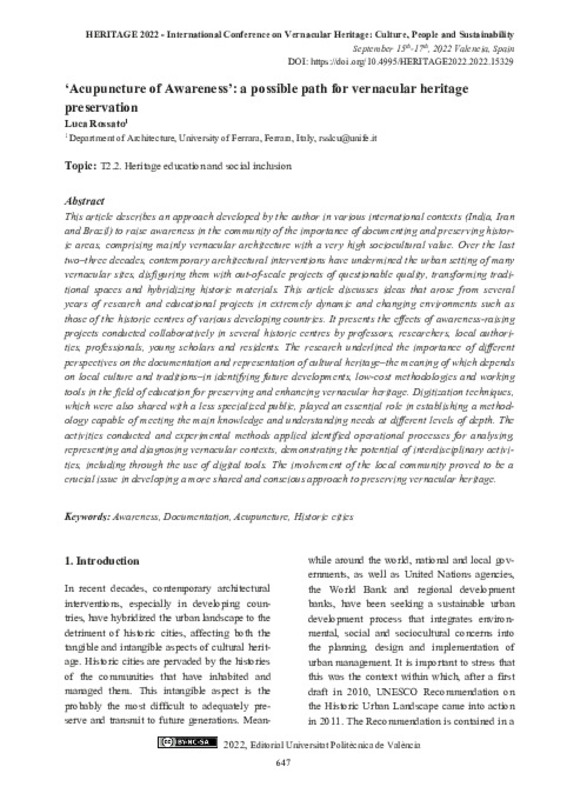JavaScript is disabled for your browser. Some features of this site may not work without it.
Buscar en RiuNet
Listar
Mi cuenta
Estadísticas
Ayuda RiuNet
Admin. UPV
‘Acupuncture of Awareness’: a possible path for vernacular heritage preservation
Mostrar el registro sencillo del ítem
Ficheros en el ítem
| dc.contributor.author | Rossato, Luca
|
es_ES |
| dc.date.accessioned | 2022-10-27T06:51:52Z | |
| dc.date.available | 2022-10-27T06:51:52Z | |
| dc.date.issued | 2022-09-13 | |
| dc.identifier.isbn | 9788413960203 | |
| dc.identifier.uri | http://hdl.handle.net/10251/188787 | |
| dc.description.abstract | [EN] The essay describes an approach developed by the author in various international contexts (India, Iran and Brazil) to raise awareness in the community of the importance of documenting and preserving historic areas, comprising mainly vernacular architecture with a very high sociocultural value. Over the last two–three decades, contemporary architectural interventions have undermined the urban setting of many vernacular sites, disfiguring them with out-of-scale projects of questionable quality, transforming traditional spaces and hybridizing historic materials. This article discusses ideas that arose from several years of research and educational projects in extremely dynamic and changing environments such as those of the historic centres of various developing countries. It presents the effects of awareness-raising projects conducted collaboratively in several historic centres by professors, researchers, local authorities, professionals, young scholars and residents. The research underlined the importance of different perspectives on the documentation and representation of cultural heritage–the meaning of which depends on local culture and traditions–in identifying future developments, low-cost methodologies and working tools in the field of education for preserving and enhancing vernacular heritage. Digitization techniques, which were also shared with a less specialized public, played an essential role in establishing a methodology capable of meeting the main knowledge and understanding needs at different levels of depth. The activities conducted and experimental methods applied identified operational processes for analysing, representing and diagnosing vernacular contexts, demonstrating the potential of interdisciplinary activities, including through the use of digital tools. The involvement of the local community proved to be a crucial issue in developing a more shared and conscious approach to preserving vernacular heritage. | es_ES |
| dc.format.extent | 8 | es_ES |
| dc.language | Inglés | es_ES |
| dc.publisher | Editorial Universitat Politècnica de València | es_ES |
| dc.relation.ispartof | Proceedings HERITAGE 2022 - International Conference on Vernacular Heritage: Culture, People and Sustainability | |
| dc.rights | Reconocimiento - No comercial - Compartir igual (by-nc-sa) | es_ES |
| dc.subject | Awareness | es_ES |
| dc.subject | Documentation | es_ES |
| dc.subject | Acupuncture | es_ES |
| dc.subject | Historic cities | es_ES |
| dc.title | ‘Acupuncture of Awareness’: a possible path for vernacular heritage preservation | es_ES |
| dc.type | Capítulo de libro | es_ES |
| dc.type | Comunicación en congreso | es_ES |
| dc.identifier.doi | 10.4995/HERITAGE2022.2022.15329 | |
| dc.rights.accessRights | Abierto | es_ES |
| dc.description.bibliographicCitation | Rossato, L. (2022). ‘Acupuncture of Awareness’: a possible path for vernacular heritage preservation. En Proceedings HERITAGE 2022 - International Conference on Vernacular Heritage: Culture, People and Sustainability. Editorial Universitat Politècnica de València. 647-654. https://doi.org/10.4995/HERITAGE2022.2022.15329 | es_ES |
| dc.description.accrualMethod | OCS | es_ES |
| dc.relation.conferencename | HERITAGE2022 International Conference on Vernacular Heritage: Culture, People and Sustainability | es_ES |
| dc.relation.conferencedate | Septiembre 15-17, 2022 | es_ES |
| dc.relation.conferenceplace | Valencia, España | es_ES |
| dc.relation.publisherversion | http://ocs.editorial.upv.es/index.php/HERITAGE/HERITAGE2022/paper/view/15329 | es_ES |
| dc.description.upvformatpinicio | 647 | es_ES |
| dc.description.upvformatpfin | 654 | es_ES |
| dc.type.version | info:eu-repo/semantics/publishedVersion | es_ES |
| dc.relation.pasarela | OCS\15329 | es_ES |








